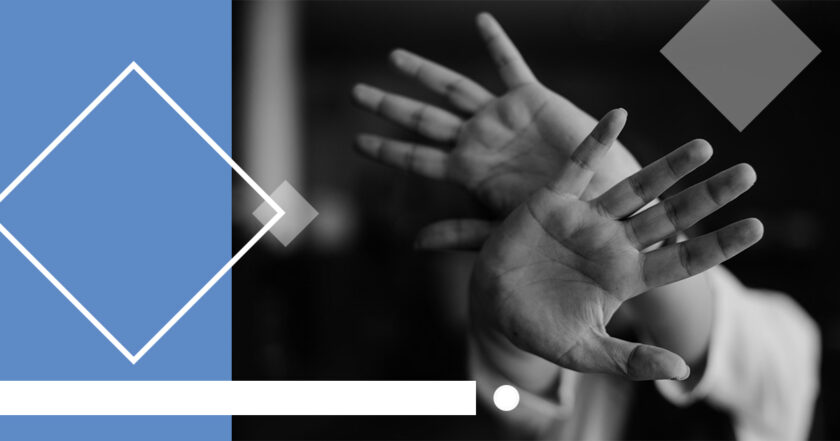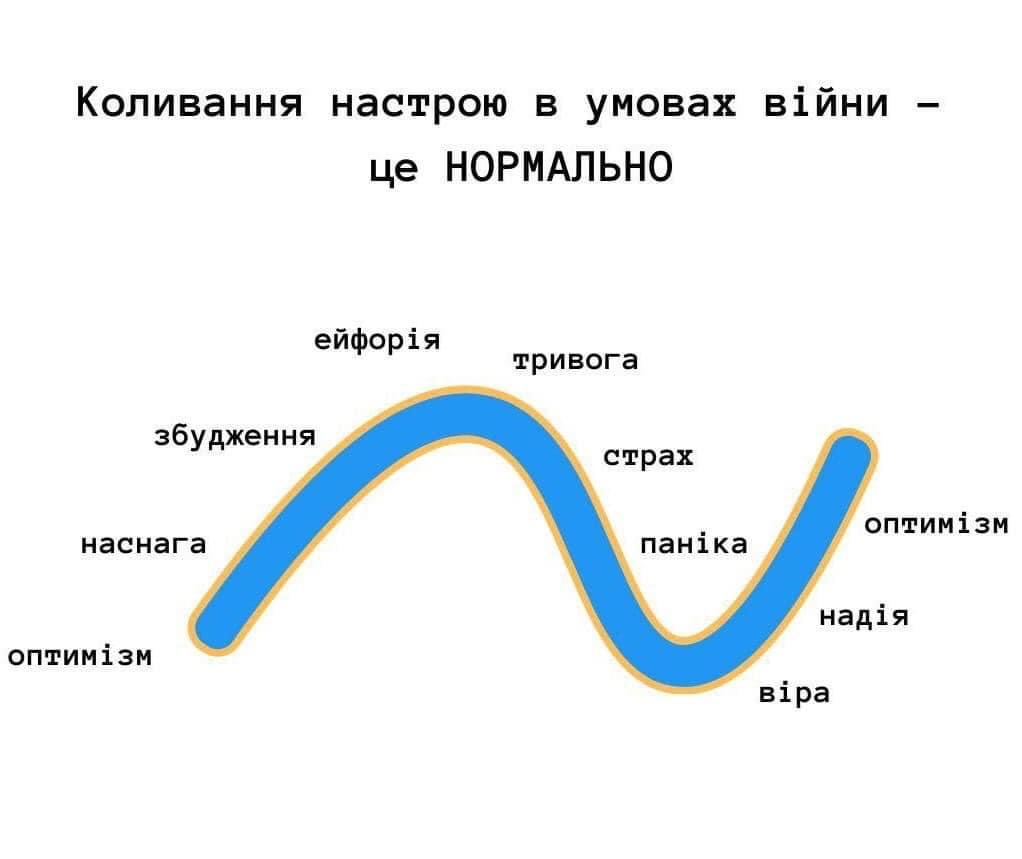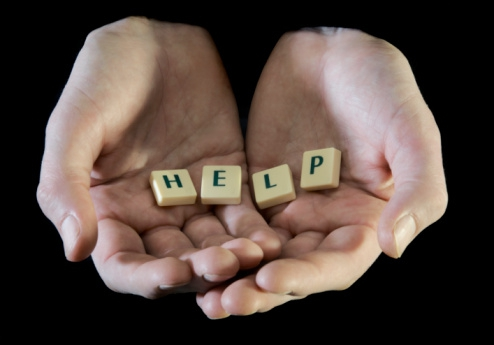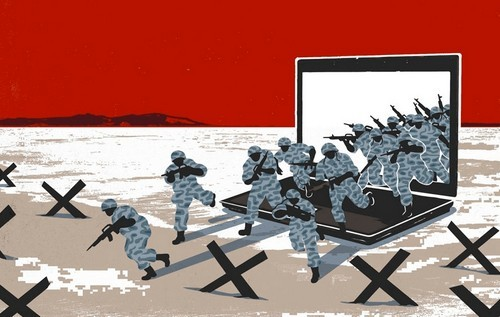Everything you feel is OK. How to preserve your mental health during the war: INSTRUCTIONS
Advice from psychologists on how to cope with fear and anxiety.

What is the problem?
It is the 21st day of the war with Russia for our independence. Ukrainians stood for another day! We will not give our land to the enemy in the future. But the nerves of many are already beginning to fail. The initial reserve of strength, which allowed each of us to mobilize and hold ourselves in his hands, has run out. War strikes at everyone's psyche and it is very important at this time to maintain their mental health and not succumb to psychological self-destruction.
What is the solution?
We need to talk to each other, support each other, instill in each other hope and faith in victory. We are stronger and more confident when we keep calm and do our own thing. We are capable when we have ourselves. And for this to work out for us, it is worth listening to the advice of psychologists.
How does it work?
The war consists not only of bombing and open combat but also of information and psychological attacks. We have already experienced all the states of psychological activity. And now a large number of people are experiencing exhaustion.
The previous state was euphoria, which was supported by wild hatred of the enemy and inexhaustible pride in our army. During the euphoria, the Ukrainians united as much as possible, gathered, and charged with fighting spirit. They could not sleep, eat or function to be prepared in full combat readiness. According to psychologists, it is energetically difficult for the brain to be constantly in this state. That's why it turns on the function of protection; people feel exhausted, feel despair, and show signs of depression.
"In a state of war, each of us can experience different emotional states," says psychologist Olha Shablovska. "Now it is normal to feel fear, helplessness, anxiety. For people who are at war, there may be mood swings, inability to feel positive emotions, indifference to what used to be fun. People can cry, be aggressive, or be in a state of 'stupor.' These states can change, go away, and come back."
Now we all need to stay fit and sober to survive what is happening. In the chaos of current events, saving oneself is the first task.
What shall I do?
If emotions become very strong and difficult to deal with, Olha Shablovska recommends the following techniques:
- Get yourself physically active (do something physically). To remove the stress hormone from the body, we need to sweat once a day from exercise.
- Breathe in squares: at the count of 1,2,3,4 inhale slowly, at the same count of 1, 2, 3, 4 hold your breath, count the same way while exhaling through the nose, and before the next breath make a pause, counting from 1 to 4; keep doing it in squares.
- Squeeze your hands firmly into fists for 10-15 seconds. Hold your breath. Exhale and relax your arms at the same time. Repeat this exercise 3-5 times.
- Think of a place where you were well and safe. Imagine moving to this place; try to feel it and yourself in it in all its details, try to hear sounds, smells. This exercise helps to switch and distract from what is happening now.
- Press your thumb on the fingertips (last phalanges), to stimulate the nerve endings. These impulses suppress anxiety. Press the pads of your fingers alternately until you feel calm.
- Pray for yourself, for your family, for Ukraine, for victory – it helps to relieve tension and feel the support of higher powers.
- Remember to sleep, eat and drink a lot! Even if you have no appetite, eat at least something – light broth, dried fruit, or oatmeal.
If you are anxious right now
- wash your face with cold water.
- breathe! Take a deep breath through your nose and exhale through your mouth.
- talk about being scared, sad, helpless. Tell others about your feelings.
- from time to time "switch": do household routine to relieve stress, do routine work – it's all for our benefit.
- if possible, drink warm tea with sugar, if there are no contraindications.
- wrap yourself in a warm blanket, hug yourself; put one hand on your chest, the other on your stomach; it adds a sense of security.
- if it is difficult to fall asleep, remember the most pleasant moments of your life, "come back" to your imagination in those moments.
- remember and firmly believe: victory is ours.
Even more useful solutions!
In addition, experts say, it is necessary to introduce several necessary healing restrictions.
- Restrict the news consumption. Of course, this will not work. But choose a time when you watch/read about what is happening (2-3 times a day for 10-20 minutes) and stick to it. Choose sources you trust (1-2, that's enough) and read them only. You will learn everything important from them, and you will not miss anything. You don't need numerous reposts and views from different angles now, you need to save yourself – that's what we do.
- Restrict the time for anxiety/panic. Choose a time when you can safely indulge in emotions (2-3 times a day for 10-20 minutes). If anxiety arises at other times, use any of the techniques mentioned above, and remind yourself that the time to "fully" panic will come when you have planned it, and for now we postpone the anxiety. You can literally put aside, for example, a symbol of anxiety in the bank, or take two or three deep exhalations in the bank, imagining that you are exhaling anxiety. When the time comes, you can worry as much as possible (can be combined with watching the news). The recommendation may sound weird, but it gives a sense of control, which we do not have enough of now, gives space for emotions, and helps to continue to do business and live life.
- Restrict anxious and angry thoughts/emotions. If possible, take the time to write down everything that worries you. By articulating what is happening to us, we activate the prefrontal cortex, which reduces the strength of emotion. You can write the names of the emotions you feel in different languages (you can google, but it is better to write by hand).
You can also help yourself to return to reality by following:
- Perform breathing exercises, move lightly: gently shake your head, do light stretching and breathing exercises, self-massage.
- Lie down/sit/stand, feel the place of collision with the support.
- Push the wall with your hands/back, feeling resistance.
- Hug yourself.
- Play with children and animals, hold them close, and pet them.
- Take different objects in your hands and describe each with three adjectives ("The pillow is soft, fluffy, blue; the table is hard, cold, strong").
- Count red/green/favorite colored objects around you.
- Mention the names of the streets on which you lived.
- Sleep hugging a pillow.
Social connections are more important now than ever. Communicate with friends and like-minded people, limit contact with those who increase, not reduce your anxiety. Apply the principles of nonviolent communication. Divide the zones of your and not your responsibility and do not take someone else's. Including feelings. Do what you can do, help others as you can, no more, otherwise you will need help. Accept help without hesitation when you need it.
From this list (as well as from other tips that you have seen or will see) you can take the ways that suit you, and do not take those that cause resistance or do not alleviate the condition. We are all in abnormal circumstances now and we are reacting to them normally, whatever that reaction may be.
We hug, breathe and believe in our victory!
Let's stand together!


























































